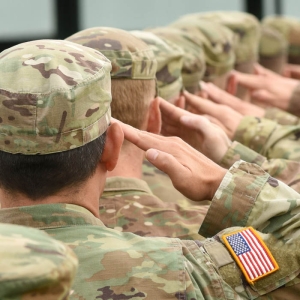USC’s Military Acceptance Project and the Landscape of LGBT Military Research in 2019
February 04, 2019- Research
New research spearheaded by associate professors Carl Castro and Jeremy Goldbach, along with Ian Holloway, associate professor at the UCLA Luskin School of Public Affairs, seeks to examine the disparities in social acceptance that exist among LGBT service members in the military.
LGBT individuals have long been integral to the U.S. military community: today, nearly 71,000 U.S. military service members identify as lesbian, gay or bisexual, while some 15,000 service members identify as transgender. Though the historic 2010 repeal of “Don’t Ask, Don’t Tell” created new protections for lesbian, gay and bisexual service members to disclose their sexuality identity without fear of unjust discharge, many choose to remain closeted today out of fear of harassment, stigma and discrimination.
Meanwhile, the plight of transgender service members has been complicated in recent months by questions of military health care funding and combat effectiveness. In the wake of a Supreme Court decision to approve what’s become known as President Trump’s transgender military ban, the subject of LGBT individuals’ right to serve has become the centerpiece of a fiery national debate.
On Jan. 18, the Society for Social Work and Research (SSWR) hosted a symposium focused on the U.S. Department of Defense (DoD)-funded Military Acceptance Project, a mixed methods study led by researchers at the USC Suzanne Dworak-Peck School of Social Work and the UCLA Luskin School of Public Affairs. Through both qualitative and quantitative methods, the project examined the extent to which sexual and gender minority (SGM) service members are socially accepted and integrated within the four branches of the U.S. military.
How the Military Acceptance Project Came to Be
After the repeal of “Don’t Ask Don’t Tell,” the DoD began seeking proposals for new research initiatives on acceptance, integration and health disparities among LGBT service members in the military. Carl Castro, director of the USC Center for Innovation and Research on Veterans & Military Families (CIR), Jeremy Goldbach, director of the USC Center for LGBT Health Equity, and Ian Holloway, associate professor at the UCLA Luskin School of Public Affairs, saw a valuable opportunity for collaboration, and in 2014, the Military Acceptance Project received one of just three full funding awards from the DoD. This research was motivated by a simple belief: “the overwhelming reason LGBT individuals join the military is to serve their country—exactly the same reason non-LGBT service members join,” Goldbach said.
Castro, Goldbach and Holloway collaborated with researchers at UCLA and California State University, Los Angeles, to conduct a multi-year study that resulted in five separate research papers. "There is a decent body of existing research on LGBT veterans, but very little on SGM active-duty service members. It's been incredibly exciting to be on the forefront of this initiative," Castro said.
A Comprehensive Analysis of the Experiences of LGBT Military Service Members
Through extensive interviews with more than 500 active-duty service members, quantitative surveys and social network analysis, researchers assessed various factors associated with physical health and cognitive perceptions of social integration and belonging experienced by SGM service members in comparison with their non-SGM peers.
“We had to examine stressors that are unique to LGBT people—such as increased risk for sexual harassment, violence and mental health conditions such as depression—as well as other general stressors that may simply be part and parcel of military life, like hazing and bullying,” Castro said.
Researchers collected data that sought to quantify differences in how non-SGM and SGM service members perceive their leaders, and whether they develop the same depth of social and emotional relationships with military peers. The team believes that by establishing a baseline level of understanding of the social factors, perceptions, stressors and health outcomes that shape the lived experiences of both non-SGM and SGM service members, their work will be able to serve as an important foundation for future research on the subject.
The Future of LGBT Military Research
Though data analysis is still underway, some important findings have already emerged. Perhaps unsurprisingly, cisgender and heterosexual service members reported that they perceived higher levels of acceptance of LGBT military service members than LGBT individuals themselves experienced. This disparity is likely due to the fact that LGBT people are more likely to experience discrimination, chronic stress, sexual harassment and assault than their peers, making them acutely aware of the ways in which inequality persists within the military.
Despite the important headway made by the Military Acceptance Project, Holloway argues that policies like “Don’t Ask, Don’t Tell” and the recent transgender ban have created hurdles to progress. “The majority of participants in our study, including those who identify as heterosexual and cisgender, believe that transgender people should be allowed to serve in the military. This data contradicts the Trump administration’s assertion that transgender people are disruptive to their units,” he said.
“Regardless of your political beliefs, it is in all of our best interests to evaluate the unique challenges and experiences of every military service member,” Castro added. “If they are serving our country, we should care about their experiences and learn how we can better meet their needs. This is a matter of national security and of human rights.”
To reference the work of our faculty online, we ask that you directly quote their work where possible and attribute it to "FACULTY NAME, a professor in the USC Suzanne Dworak-Peck School of Social Work” (LINK: https://dworakpeck.usc.edu)
